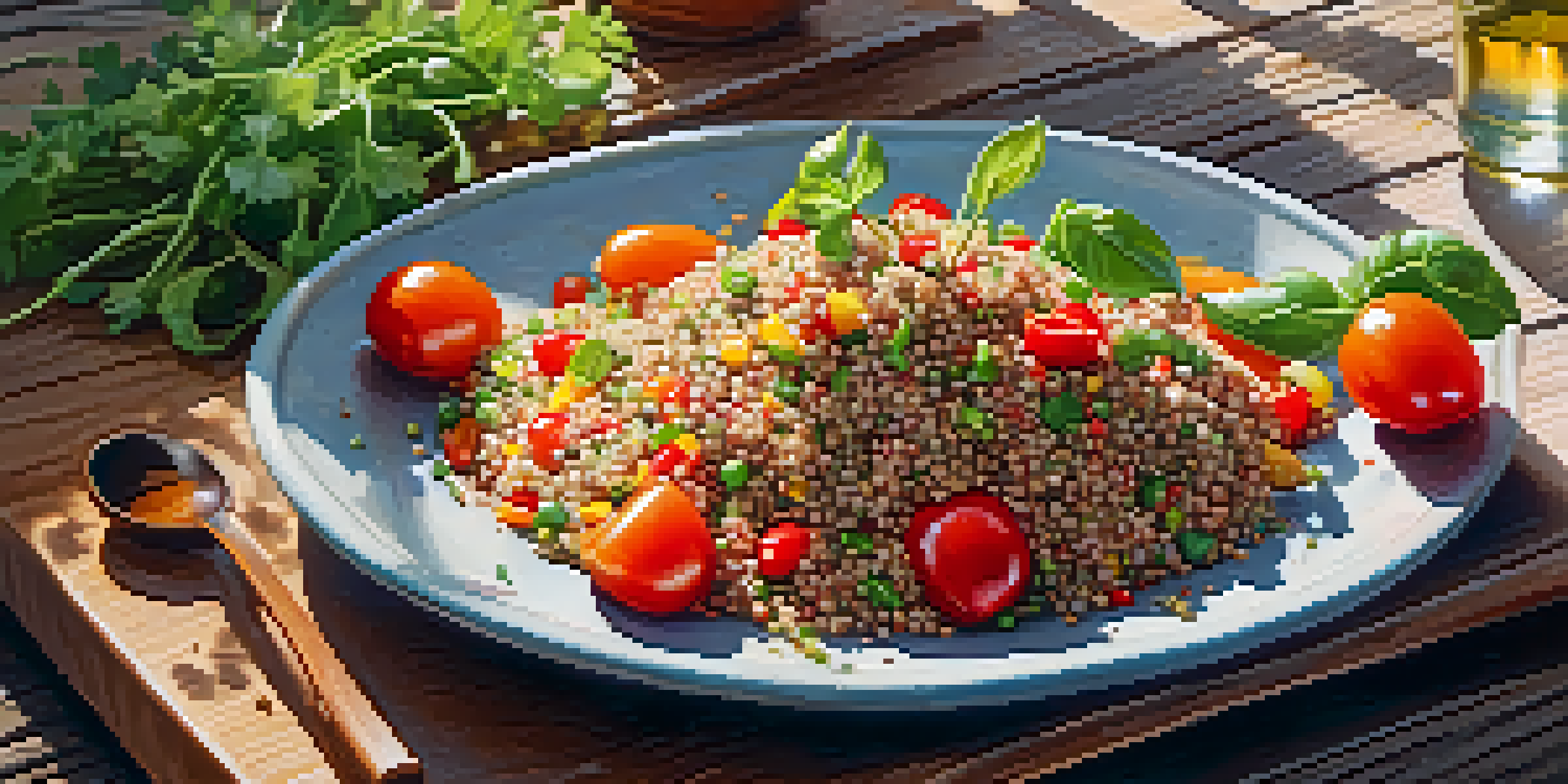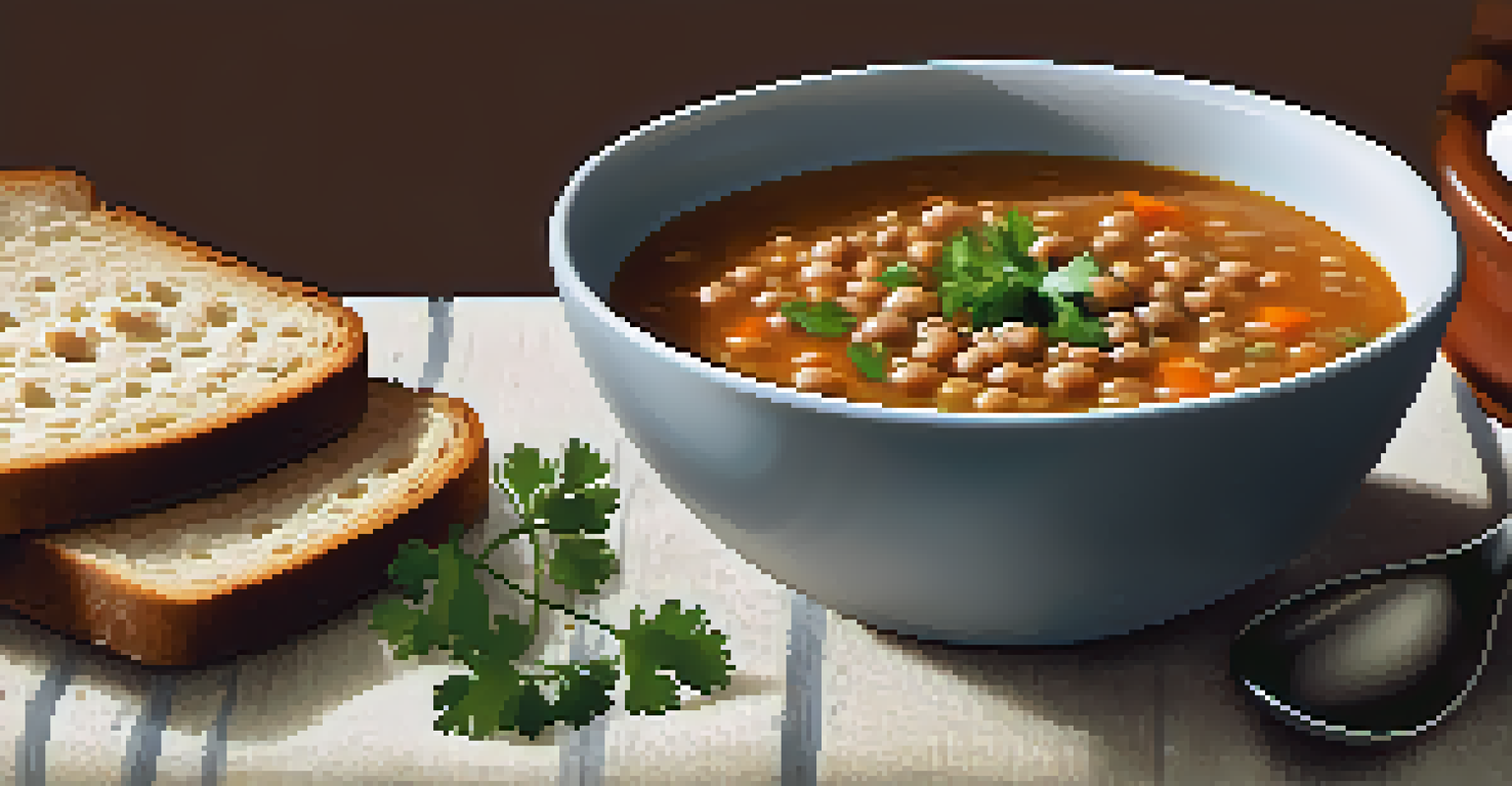Top 10 Nutritional Myths About Vegetarian Diets Debunked

Myth 1: Vegetarians Don't Get Enough Protein
One of the most persistent myths is that vegetarians struggle to meet their protein needs. In reality, there are plenty of plant-based protein sources, such as lentils, beans, tofu, and quinoa, that can easily fulfill daily requirements. For example, a cup of cooked lentils has about 18 grams of protein, which is comparable to some meat options.
Eating meat is not a requirement for good health. A well-planned vegetarian diet can provide all the nutrients you need.
Moreover, combining different plant proteins can create a complete amino acid profile. Think of rice and beans; together, they make a nutritious protein-packed meal. So, vegetarians can confidently enjoy a variety of delicious dishes while meeting their protein goals.
It's essential to educate others about the nutritional value of plant-based foods. With a little knowledge, anyone can see that a well-planned vegetarian diet is more than capable of providing all the protein needed for a healthy lifestyle.
Myth 2: You Can't Get Enough Iron on a Vegetarian Diet
Another common misconception is that vegetarians are at risk of iron deficiency. While it's true that plant-based iron (non-heme iron) is not absorbed as efficiently as the iron found in meat (heme iron), there are still plenty of sources available. Foods like spinach, lentils, chickpeas, and fortified cereals can provide ample iron when consumed regularly.

Additionally, pairing iron-rich foods with vitamin C sources, like citrus fruits or bell peppers, can enhance absorption. For instance, a spinach salad topped with strawberries not only tastes great but also boosts iron uptake. This simple tip can make a significant difference in maintaining healthy iron levels.
Vegetarians Can Meet Protein Needs
A well-planned vegetarian diet includes plenty of protein-rich foods like lentils, beans, and quinoa to satisfy daily requirements.
So, while vegetarians may need to be a bit more mindful of their iron intake, with a balanced diet and some smart food combinations, they can easily meet their nutritional needs.
Myth 3: Vegetarian Diets Are Always Low in Calcium
Many people assume that without dairy, vegetarians can't get enough calcium. However, there are numerous plant-based sources rich in this vital mineral. Foods like kale, broccoli, almonds, and fortified plant milks can provide the calcium necessary for strong bones.
A vegetarian diet can be healthy, nutritious, and delicious, and it's all about how you plan your meals.
For example, a cup of fortified almond milk can have as much calcium as a glass of cow's milk. This opens up a world of options for those who choose to avoid dairy, proving that a vegetarian lifestyle doesn't mean sacrificing calcium.
It's all about knowing where to look. With a bit of planning, vegetarians can easily incorporate various calcium-rich foods into their diets, ensuring they maintain healthy bones and overall well-being.
Myth 4: Vegetarian Diets Lack Essential Nutrients
Another myth is that vegetarian diets cannot provide essential nutrients like vitamin B12, omega-3 fatty acids, and zinc. While some of these nutrients are more readily available in animal products, vegetarians can still obtain them through thoughtful dietary choices. For instance, fortified foods or supplements can help meet B12 needs.
Omega-3 fatty acids, typically found in fish, can be sourced from flaxseeds, chia seeds, and walnuts. These foods serve as excellent alternatives, ensuring vegetarians still receive the heart-healthy benefits of omega-3s. In addition, legumes and whole grains can provide adequate zinc.
Iron Absorption Can Be Enhanced
Pairing iron-rich plant foods with vitamin C sources boosts iron absorption, helping vegetarians maintain healthy levels.
By being proactive and informed, vegetarians can enjoy a diet rich in essential nutrients that support overall health. A little planning goes a long way in creating a balanced vegetarian lifestyle.
Myth 5: Vegetarian Diets Are Automatically Healthy
It's easy to assume that all vegetarian foods are healthy, but not all plant-based options are created equal. Processed vegetarian foods can be high in sugar, sodium, and unhealthy fats, which can lead to health issues if consumed in excess. For instance, a veggie burger loaded with preservatives may not be much better than a traditional burger.
To truly reap the benefits of a vegetarian diet, it's vital to focus on whole, nutrient-dense foods like fruits, vegetables, whole grains, nuts, and seeds. Incorporating a variety of these foods can help ensure a well-rounded diet that supports overall health.
Remember, just because something is labeled as vegetarian doesn't mean it's automatically a healthy choice. Being mindful of food quality is key to a successful and nutritious vegetarian lifestyle.
Myth 6: You Can't Build Muscle on a Vegetarian Diet
A common belief is that vegetarians can't build muscle effectively. However, many athletes thrive on plant-based diets, proving that strength training and vegetarianism can go hand in hand. The key is to consume adequate calories and protein from various plant sources to fuel muscle growth.
Foods like legumes, nuts, seeds, and whole grains provide the necessary building blocks for muscle repair and growth. For instance, a smoothie made with protein-rich plant-based protein powder, spinach, and almond milk can be a perfect post-workout recovery drink.
Vegetarian Meals Can Be Flavorful
A vegetarian diet offers a diverse range of flavorful dishes, utilizing various herbs, spices, and cooking techniques to enhance meals.
With the right approach and a focus on nutrient-dense foods, vegetarians can absolutely achieve their fitness goals while maintaining a balanced diet. It's all about understanding how to nourish your body effectively.
Myth 7: Vegetarian Diets Are Too Expensive
Many people believe that following a vegetarian diet is overly expensive, but this isn't always the case. In fact, staple foods like beans, lentils, rice, and seasonal vegetables are often quite affordable. By focusing on whole foods rather than processed items, vegetarians can eat healthily without breaking the bank.
Meal planning can also help save money by reducing food waste and making the most of bulk purchases. For example, cooking a big batch of chili or vegetable stew can provide multiple meals for the week, keeping both your budget and your stomach satisfied.

Ultimately, with a little creativity and planning, vegetarian diets can be both nutritious and budget-friendly. It's all about making smart choices at the grocery store.
Myth 8: Vegetarian Diets Are Boring and Flavorless
The idea that vegetarian meals are bland and unexciting couldn't be further from the truth. In reality, a vegetarian diet opens up a world of flavors and cuisines, allowing for creativity in the kitchen. From spicy Indian curries to vibrant Mediterranean salads, there's no shortage of delicious options.
Experimenting with herbs, spices, and different cooking techniques can elevate any vegetarian dish. For instance, roasting vegetables brings out their natural sweetness, making them a delightful addition to any meal. Pairing them with a zesty dressing can turn a simple salad into a flavor-packed experience.
So, if you think vegetarian food is boring, it’s time to explore the vast array of recipes and flavors that can transform your meals into something truly exciting. The culinary possibilities are endless!